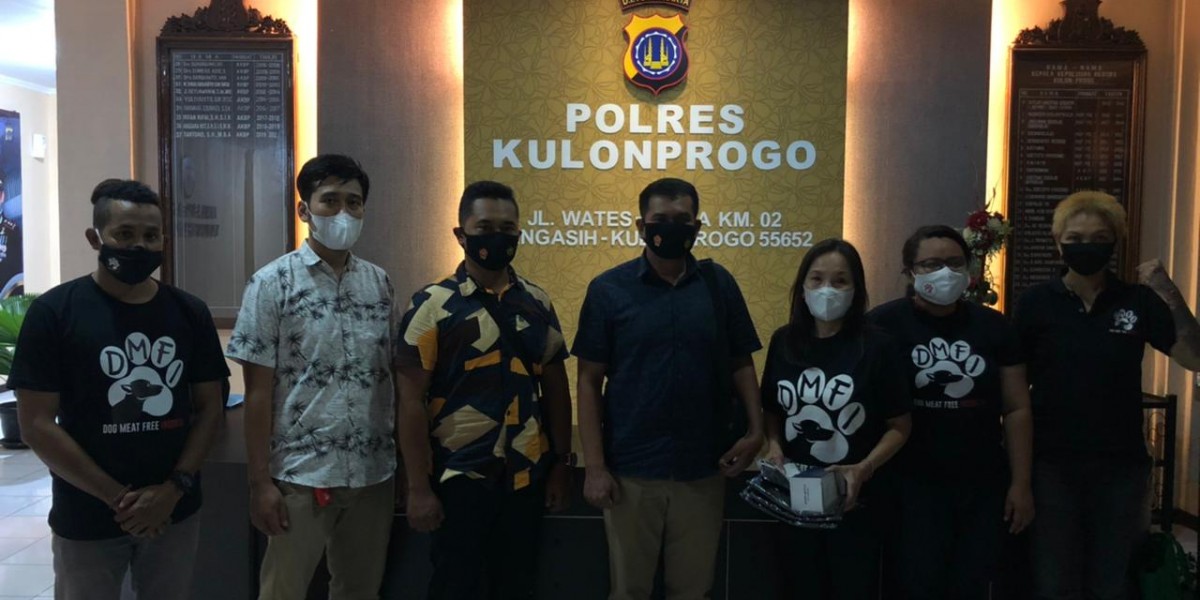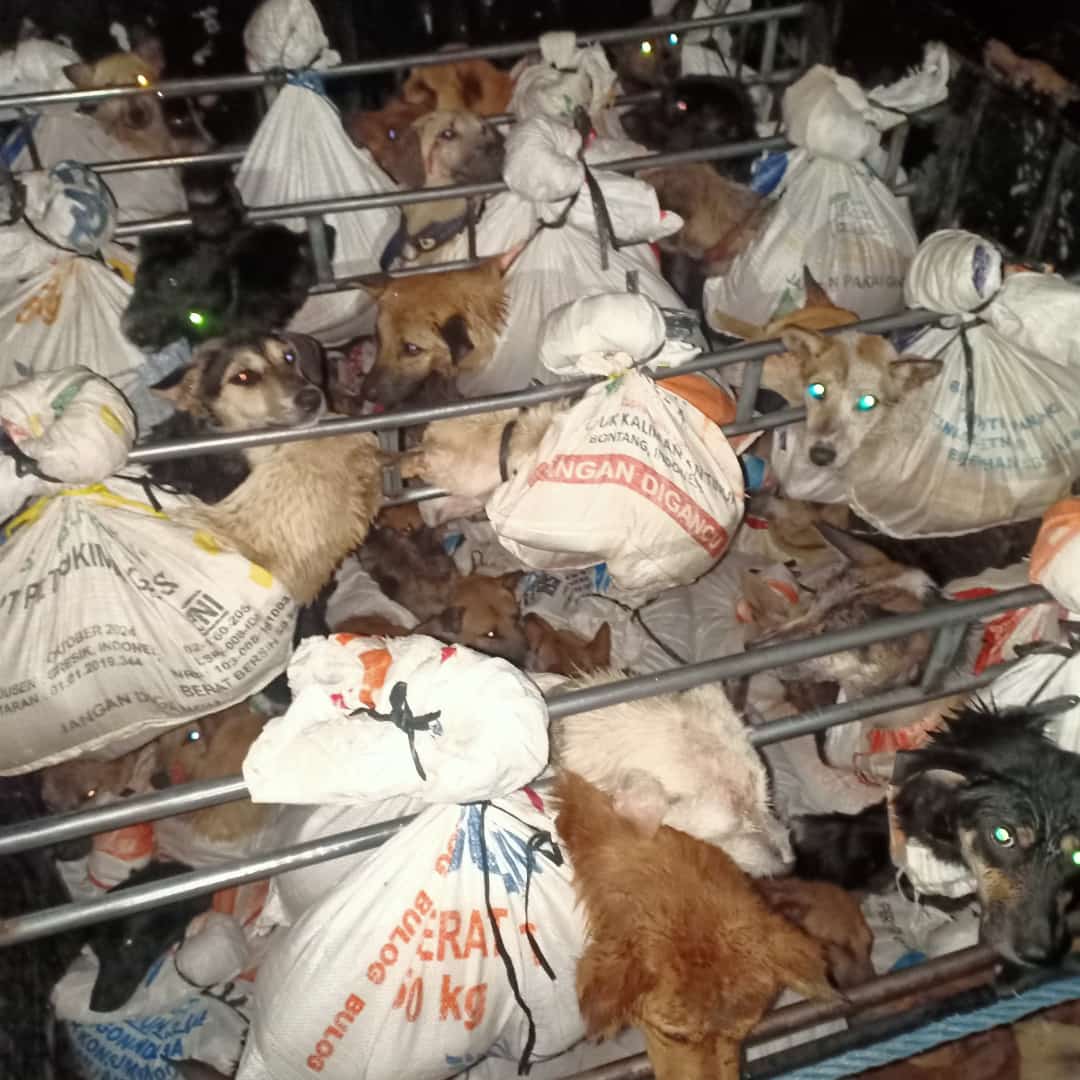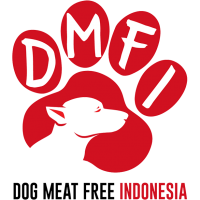
Dog meat traders to be prosecuted for the first time in Indonesian history after truck with 78 dogs intercepted by police
Kulon Progo, Indonesia (23 Aug. 2021) – Indonesia’s first ever prosecution of dog meat traders under animal health laws is set to go ahead, officials have confirmed, in what the country’s animal campaigners hope will be a major turning point in the demise of the brutal trade. Kulon Progo District Police intercepted the gang in May this year when they were illegally transporting 78 dogs bound and gagged in the back of a truck. The dogs were headed for slaughter for human consumption throughout Central Java. This was the first ever such interception in Indonesia, and followed discussions with the Dog Meat Free Indonesia coalition which campaigns for a nationwide ban on the brutal trade.
The Kulon Progo District Attorney’s Office confirmed in a statement its intention to prosecute the traders who are considered to have violated Article 89 of Law No. 18/ 2009 concerning Livestock and Animal Health, with a maximum penalty of five years imprisonment or a maximum fine of 1.5 billion IDR (over $100,000 USD); as well as Article 140 of Law No. 18/ 2021 on Food, with a maximum sentence of two years imprisonment or a maximum fine of 4 billion IDR (over $275,000 USD).

The dogs in this case had all been stolen from the streets where pet dogs freely roam. Many were still wearing collars whilst bound on the truck to be transported from West Java on a gruelling journey lasting more than 10 hours. The traders illegally crossed provincial borders with the dogs, with no record of the animals’ disease or vaccination status. For example, Solo is an epicentre for much of Java’s dog meat trade, with 85 street stalls selling dog meat, brutally slaughtering an estimated 13,700 dogs each month in filthy makeshift slaughterhouses with no way of ensuring the meat is safe for consumers.
The Dog Meat Free Indonesia coalition has conducted numerous investigations over the past several years, exposing the brutal reality of the trade in dogs destined for human consumption. Every month, tens of thousands of these dogs are taken from the streets and illegally transported in many parts of Indonesia. Many die during this horrific journey from heatstroke, dehydration or injuries inflicted during capture and transport. Those who survive are taken to slaughterhouses where they are beaten and strung upside down to bleed out while still conscious or beaten to death in public markets in some parts of the country, in full view of other terrified dogs who await their turn.
Lola Webber, Humane Society International’s dog meat campaign director, who is based in Indonesia, says: “There are thousands of dog trucks across Indonesia just like this one, illegally transporting terrified and disease-vulnerable dogs across provincial borders to slaughterhouses and markets. We have documented first-hand dogs being slaughtered in public alongside myriad wild and domestic species in markets in North Sulawesi. It is easy to see how this trade is not only utterly brutal, but also the perfect breeding ground for the next serious public health disaster. New pathogens could jump to humans in a number of ways – a dog trader wounded during the day’s slaughter, a local consumer eating cross-contaminated dog meat bought at a nearby stall, or a tourist breathing in microscopic blood droplets as they sight-see the markets. So in the face of such an obvious public health and animal welfare risk, it is good to see what we hope to be the first of many interceptions and prosecutions. We cannot allow the dog meat trade to thrive across Asia if we hope to protect the public from future pandemics.”
“We commend Kulon Progo District Police for setting such a good example for the rest of the country by taking direct action, and we congratulate Karanganyar and Sukoharjo Regencies and Salatiga City for explicitly prohibiting the trade in their jurisdictions on the grounds of public and animal health and welfare. We now need to see the same level of activity across Indonesia to stamp out this cruel, dangerous and unwelcome trade.”
Dog meat trade facts:
- Opinion polls show that only a small minority of Indonesia’s population (4.5%) consume dog meat and only a very small number of those involved in the trade rely on dog meat as their main source of income.
- Rabies is a grave concern in Indonesia, with just eight out of 34 provinces declared rabies-free. Provinces such as Central Java are jeopardising their rabies-free status by allowing dogs of unknown disease and vaccination status to be imported from surrounding provinces to supply dog meat, despite opinion polls showing just 3% of Central Javans consume it.
- The illegal movement of large numbers of dogs of unknown disease status into densely populated areas contravenes rabies control recommendations by leading human and animal health experts including the World Health Organization, the Pan American Health Organization, and the Food and Agriculture Organization of the United Nations as well as national disease prevention legislation.
- There are widely publicised reports directly linking the dog meat trade to rabies transmission in many parts of Asia where the dog meat trade operates, including Indonesia. Scientific reports have documented rabies-positive dogs being sold and slaughtered in markets in Indonesia, as well as in restaurants and slaughterhouses in China and Viet Nam.
- Dog theft for the meat trade is a serious problem in Indonesia. Dog Meat Free Indonesia has interviewed many residents who have described their terrifying ordeal with armed traders stealing their pets at night. Despite the obvious law-breaking, thefts are rarely taken seriously by law enforcement, so the thieves go unpunished.
- Across Asia, opposition to the dog and cat meat trades is increasing, with an ever-growing number of countries and territories (Taiwan, Hong Kong, the Philippines, Thailand and two major cities in mainland China) banning the trade in and slaughter, sale and consumption of dogs.
- The Dog Meat Free Indonesia campaign has received support from global and Indonesian superstars including a letter to President Joko Widodo in 2018 calling for action to end the country’s dog and cat meat trades signed by Simon Cowell, Sophia Latjuba, Yeslin Wang, Nadia Mulya, Lawrence Enzela, Cameron Diaz, Chelsea Islan, Ellen DeGeneres and Pierce Brosnan.

